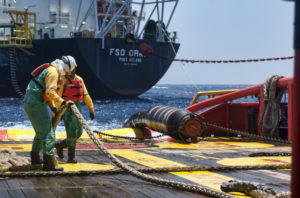Most of TMSA elements have been revised & a detailed gap-analysis is required. Significant changes are described here below:
– New KPI’s related to HSSE Excellence should be established & assessed through a clear time-frame action plan.
– Strategic Planning should be a vital organizational management activity aiming to set priorities & to ensure that employees & other stakeholders are working toward common goals.
– Continuous Improvement & Performance Management are enriched with new KPI’s.
– Extensively Revised Element 5 for Navigational Safety, especially navigational procedures review, navigational equipment defects, navigational audits & competency assessment programs.
– Extensively Revised Element 6 & 6A for Cargo, Ballast, Tank Cleaning, Bunkering, Mooring & Anchoring Operations.
– Extensively Revised Element 10 for Environmental & Energy Management.
– A new element introduced related to Maritime Security & Cybersecurity.
– Training is required for the development of cross-cultural interpersonal skills.
– Computer-based assessments & Scenario-based simulator assessments are vital tools for crew members training.
– Updated SMS procedures should be implemented to ensure that manning levels are adequate, complaint & discipline procedures are in place.
– Management of Change Procedures should identify emerging requirements.
– Emergency Response Plan, Business Continuity Plan & Recovery Procedures should be implemented addressing events that may results serious disruption of the daily business.
– Updated procedures ensure that incidents are investigated & analyzed through a simple & user friendly reporting system.
– New KPI’s related to fleet reliability should be established & structural inspections should be aligned to detailed risk assessment, regulatory requirements & current industry recommendations.
– Engineering Audits should be conducted & included to an Annual Audit Plan.
-Updated SMS procedures should be implemented to manage maintenance of critical equipment/system, especially testing & deferment process.
– Defect reporting system & COC should be linked to a well planned maintenance system.
– A formal system to develop dry-dock specifications should be implemented.
– Updated software management procedures should be implemented to cover all shipboard & shore systems.
– Detailed procedures for contractors’ management.
– Risk assessment for routine tasks should be conducted to develop safe working procedures.
– Regulatory publications & industry guidelines should be provided as a supplement to the SMS both onboard & ashore.
Contact us to conduct a detailed gap analysis &
to receive a professional advisory in your area of interest.
